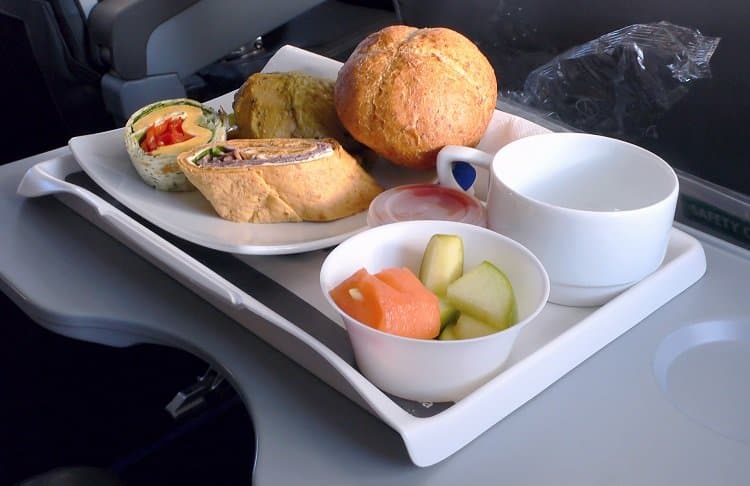For me, food is one of the greatest joys of travel. When I start planning a trip I’m usually dreaming about what I’m going to eat before thinking about what we are going to do. So what does a foodie do when she suddenly has to worry about what she can eat?

Photo by kakisky from morgueFile
I’ve always prided myself on being a non-fussy eater. We can go anywhere, I would tell a friend as we greeted each other for a meal overseas…I eat anything. Well, those days are over for me. I recently found out that I have a genetic mutation requiring me to change my diet. It’s a little complicated to get into here, but basically my body doesn’t detoxify as easily as a “normal” person. I am also prone to vitamin deficiencies and can actually be harmed by eating foods fortified with the wrong forms of B vitamins. It is best that I’m on a gluten and dairy-free diet and for me to limit my intake of processed foods and alcohol.
Yikes. Readers of this blog will know that John and I love our craft beer and have enjoyed eating all kinds of food as we make our way around the world. I have never turned down a drink or a bite of anything for as long as I can remember. I don’t usually overeat so dieting for weight loss isn’t something that I tend to do very often. I’m just not used to restrictions. But as I get older I’ve become more concerned about my health and this new discovery, combined with another chronic condition that I have (hypothyroidism), has shown me that some of the niggling health issues I’ve been dealing with for the last year may very well be caused by this issue. A change of diet is crucial for me at this stage in my life.
I was particularly tested on our recent trip to Las Vegas. Never before have I had such a quiet Vegas trip, enjoying only one or two drinks in the evening and adhering to a strictly gluten and dairy-free diet. I also already eat organic, drink only bottled water and avoid soy as much as possible, so the addition of further restrictions in a place like Las Vegas was particularly interesting. I found that I could pretty much only eat one or two things on each menu and had to forgo many of my favorite food items like hamburger buns, the bread basket, fried chicken and Italian food. Overall I still had a good time and ate plenty of delicious things. It just took a bit more effort than normal.

At home, I’ve been cooking more and we eat out less. Thankfully we are back in the United States now where there are tons of gluten-free products and dairy alternatives. I have my organic produce delivery service and a local co-op, as well as alternative supermarkets like Whole Foods, Sprouts and Trader Joe’s. Our local, HEB has a really nice selection of hormone and antibiotic-free meats and eggs, some organic fruits and vegetables and plenty of gluten-free items. I’m so impressed with the amount of things that I can eat that I really never feel deprived. But travel is a whole other animal. On the road I will feel like I’m missing out, especially when it comes to regional dishes and delicacies. In some instances, yes, I can just “cheat” on my nutrition plan. Supplements help out with a lot of my issues and it’s not the end of the world if I have a drink now and then or indulge in something that is essentially toxic for my particular body. I am grateful to not have Celiac’s disease where I absolutely have to worry about cross-contamination from gluten, or a food allergy that could instantly kill me.
Here are some tips I have learned so far for dealing with food restrictions:
Bring your own snacks
I find that snack time is the most difficult, especially when travelling. While a restaurant usually can or does cater to alternative diets, smaller snack stands or vending machines will often have nothing for you. It’s easy to pack your own snacks and this can also be a lifesaver if you have to visit several restaurants at meal-time to find a suitable one. I always get hungry when I have to walk from place to place.
Choose places that will cater to you
When looking for a hotel, breakfast is important if it is included and you want to ensure that you won’t be left with nothing on your plate after you’ve paid for it in your room rate. Many B&Bs ask their guests if they have dietary requirements when the reservation is made and larger hotels usually have buffets with ample choices. It is important to always ask, however, especially when staying at smaller hotels. If you’re going on a tour with meals included, it will be important to confirm that the company can cater to your dietary needs. Most of the high-end restaurants with degustation menus ask at the start of the meal whether anyone at the table has any special needs, but you can also call ahead to enquire. This goes for countries too. I recently noticed on Katie Aune’s travel blog, for example, that Finland offers gluten-free foods throughout the country. She also mentions Italy, Northern Europe and Scandinavia as excellent gluten-free destinations. If you’re tossing up between one destination and another, that could easily be a deciding point.

Seek out diet-specific restaurants
The internet is your friend here. Search for a gluten-free directory in the particular city where you’re located and use it to find favorable places to dine. Sites like Yelp usually have a ‘gluten-free’ category for restaurants or you can find apps like Is That Gluten-Free? or iEatOut, which also lists for allergy-friendly establishments. Many restaurants are catering for special diets these days and it’s easy to call up and ask. Vegan or vegetarian restaurants can be a great alternative for those with very restricted diets and many Indian restaurants have vegetarian menus.
Focus on what you can eat
While it is sad to miss out on foods, I never dwell on it. There are probably lots of amazing foods that you can eat and I tend to focus on those. The wonderful thing about travel is that you’re usually exposed to lots of different new foods every day and you’ll be able to eat many of them. Variety keeps you busy and happy.
Make your own
Save lunchtime headaches by heading to the supermarket in the morning and making your own picnic. Even better, visit the local market for fresh, organic produce and a dose of resident culture.

Call ahead
I’ve never flown on an airline that doesn’t have a wide variety of meals suited to specific diets, particularly when it comes to international flights or those that include a meal. Call the airline at least 24 to 48 hours in advance to organize one for yourself (the good news here is that you get to eat first as these meals are usually served ahead of the general menu). This rule goes for other establishments as well – it pays to ask and you’ll often be surprised at how eager your hosts will be to please you.
Don’t forget to translate
If you’re headed to a country where the language will be a problem, be sure to translate your requirements ahead of time so you know what to ask for. Make index cards with the phrases on them so you can easily show the person who will serve you food what your dietary restrictions are. This is especially important if you’ll be travelling outside of large cities where options and the foreign-language skills of the locals are likely to be limited.
Allergies are a lot more tricky. Unfortunately for people with severe food allergies, going out to a restaurant can be life-threatening because of cross-contamination or simple carelessness on the part of the kitchen or food server. Be sure that the person who is taking your order understands what you are asking for and get a manager if you are at all unsure. It is not worth it to take risks with your life. I really like this article from Suitcase and Strollers on the topic of travel with dietary restrictions.
If you’re interested in the particular genetic disorder that I’m dealing with, which may be relevant to you or someone you know because it’s been estimated that 30-40 percent of people have at least one of these mutations, please check out my new website devoted to the subjects of MTHFR and hypothyroidism. The genetic mutations can potentially lead to serious health problems if left unacknowledged but the good news is that a proper lifestyle, diet and vitamin supplementation are all you have to do to fix yourself and prevent more serious illnesses down the line. As always, I’d love for you to leave your own tips, thoughts and experiences on this issue in the comments below.
